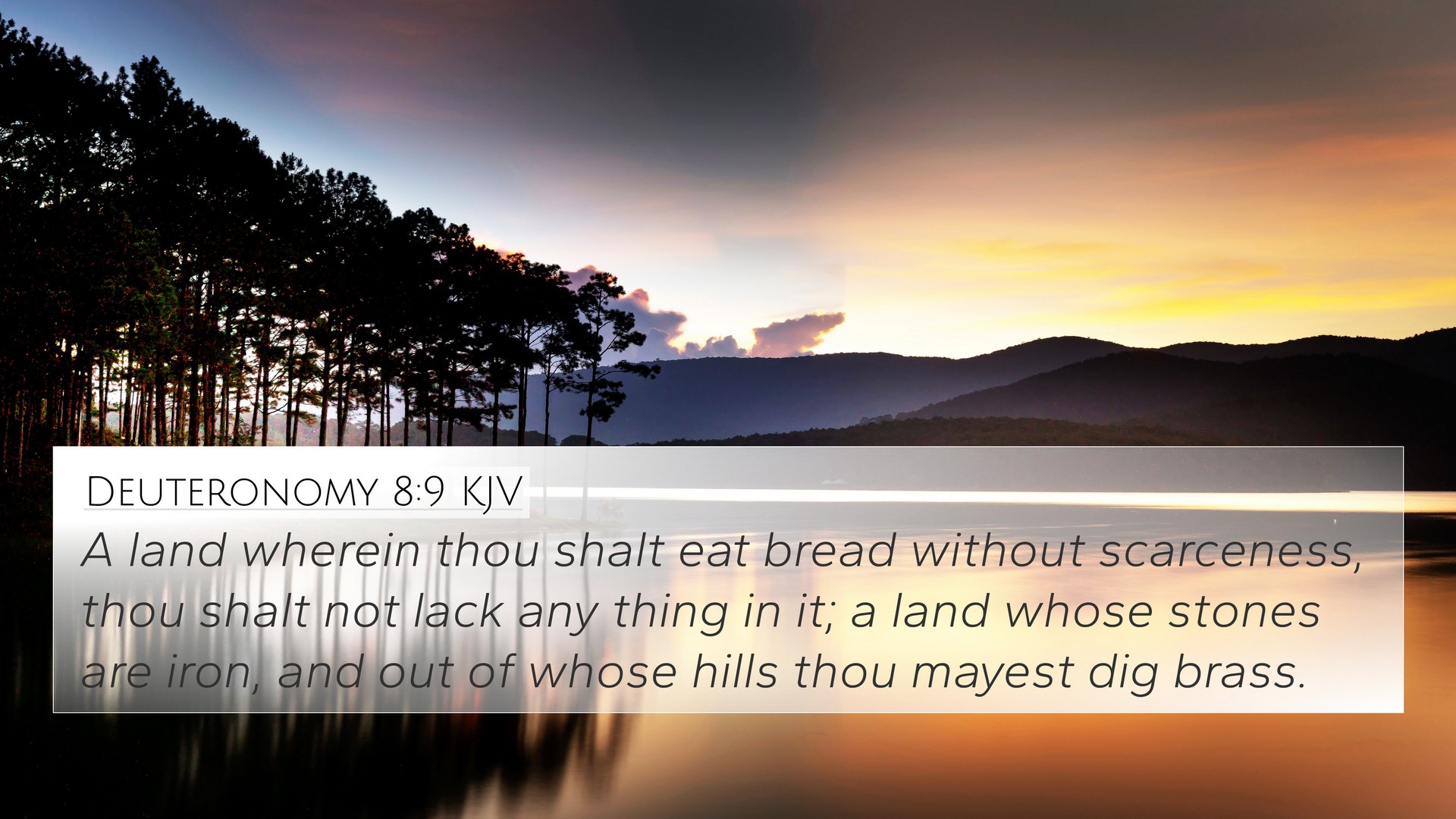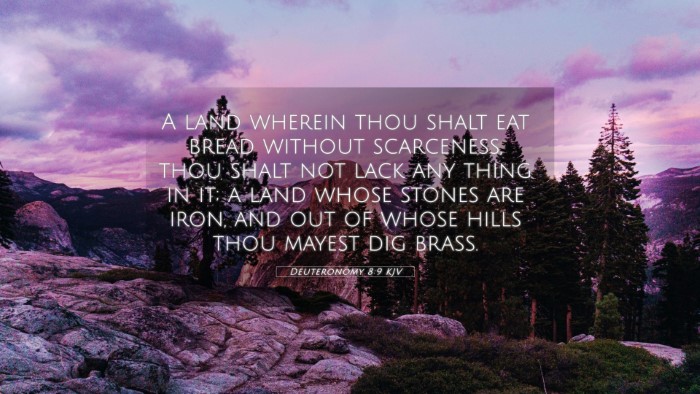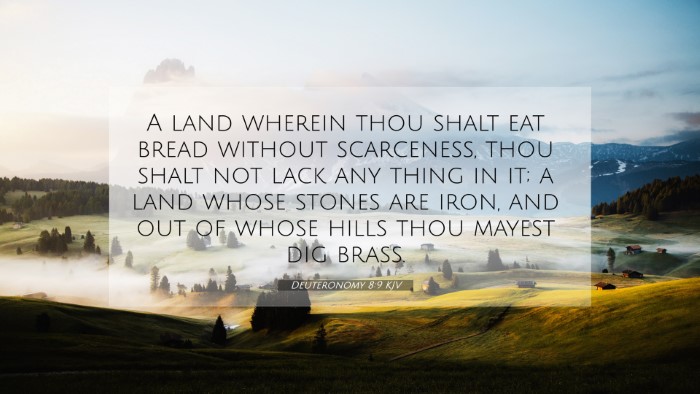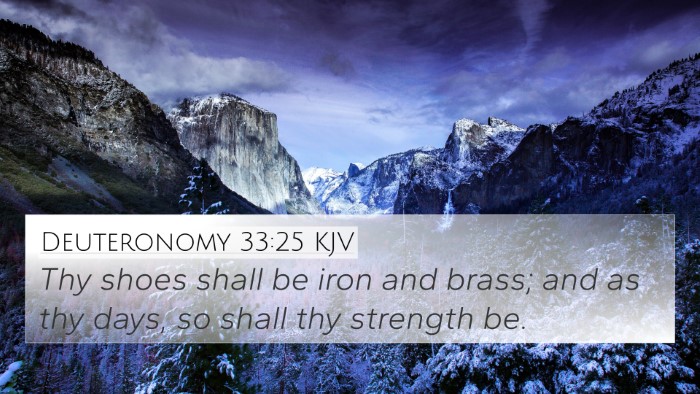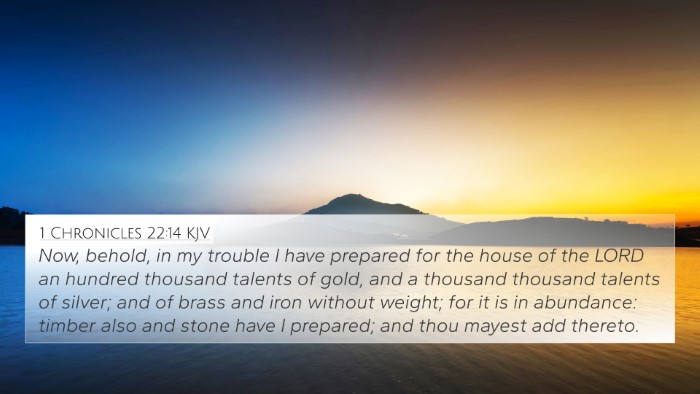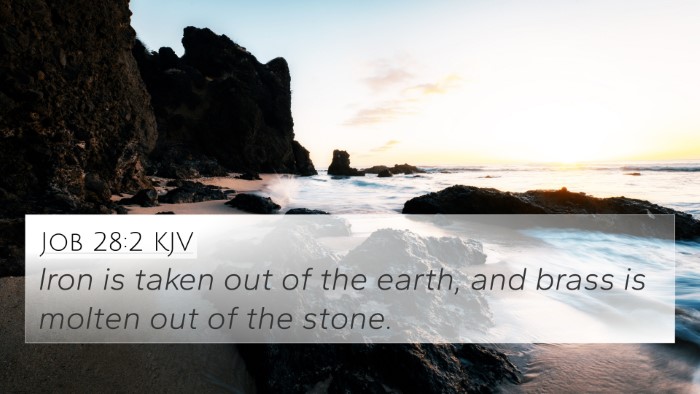Understanding Deuteronomy 8:9
Deuteronomy 8:9 states: "A land wherein thou shalt eat bread without scarceness, thou shalt not lack any thing in it; a land whose stones are iron, and out of whose hills thou mayest dig brass."
This verse reflects the abundant provision that God promised to the Israelites as they prepared to enter the Promised Land. The blessing of a fertile land rich in resources signifies God’s care and promise of sustenance for His people.
Interpretation and Insights
The implications of this verse can be comprehended through insights from public domain commentaries such as those by Matthew Henry, Albert Barnes, and Adam Clarke:
- Matthew Henry: He emphasizes the physical and spiritual blessings that come from God. The "bread without scarceness" points to the divine provision that satisfies both bodily needs and the soul's thirst. This alludes to God’s abundant goodness that is not limited by human circumstances.
- Albert Barnes: Barnes reflects on the descriptions of the land, asserting that its richness symbolizes God’s covenant faithfulness to Israel. He highlights that the absence of lack indicates both material and spiritual sufficiency. In his view, the "stones are iron" indicates the strength and stability that God’s people will experience in their new home.
- Adam Clarke: Clarke elaborates on the types of food and wealth that the land provides. He notes the importance of recognizing the source of these blessings, which is God. Clarke also emphasizes the need for the Israelites to remember and not become arrogant or forgetful about God's provision as they enjoy the blessings.
Cross-References to Deuteronomy 8:9
This verse can be linked to several other passages that collectively illuminate its themes:
- Exodus 3:8: God's promise to lead Israel to a "good and large land." This sets the stage for the fulfillment mentioned in Deuteronomy 8:9.
- Deuteronomy 11:10-12: Discusses the agricultural richness of the land that Israel will inherit, reinforcing the themes of divine provision.
- Psalm 37:25: David speaks of God's faithfulness in providing for His people, resonating with the assurance given in Deuteronomy 8:9.
- Philippians 4:19: "But my God shall supply all your need according to his riches in glory." This New Testament promise reflects God’s continued provision.
- Isaiah 33:16: Describes the rewards of righteousness, including security and sustenance, highlighting God’s protection and provision.
- Matthew 6:31-33: Jesus' teaching on reliance on God for needs supports the message of trust found in Deuteronomy 8:9.
- Romans 8:32: Affirms that God who did not spare His own Son will graciously give us all things, connecting divine provision across the Testament.
Thematic Connections
This verse opens a broader discourse on the thematic connections throughout Scripture regarding God's provision:
- Comparative Bible Verse Analysis: Understanding how God provides materially and spiritually across different books of the Bible—drawing parallels from the experiences of Israel to New Testament teachings on providence.
- Inter-Biblical Dialogue: Consider how Old Testament promises evolve into New Testament realities, understanding how themes of provision culminate in Christ's statements on care and sustenance.
- Contextual Understanding: Deuteronomy stands as a reflection for later biblical texts, giving insight into how God’s people are called to respond to His provision with gratitude and faith.
Applications and Reflections
As we reflect on Deuteronomy 8:9, we can ask ourselves:
- How can we cultivate a deeper appreciation for God's provision in our lives?
- In what ways do we recognize and respond to the gifts God has given us?
- How can we assist others to recognize God’s sufficiency, drawing from the assurance depicted in this verse?
Conclusion
Deuteronomy 8:9 serves as a powerful reminder of God's generous provision and unfailing support. By cross-referencing this verse with others throughout the Bible, one can develop a more robust understanding of the interconnectedness of God’s promises—both in the Old and New Testament—and the overarching narrative of God’s care for His people.
The study of Bible verse cross-references and connections between Bible verses provides a crucial framework for understanding the richness of scripture. Engaging with thematic Bible verse connections and seeking insights through various Bible reference resources can enhance one's spiritual journey and comprehension of God’s Word.
